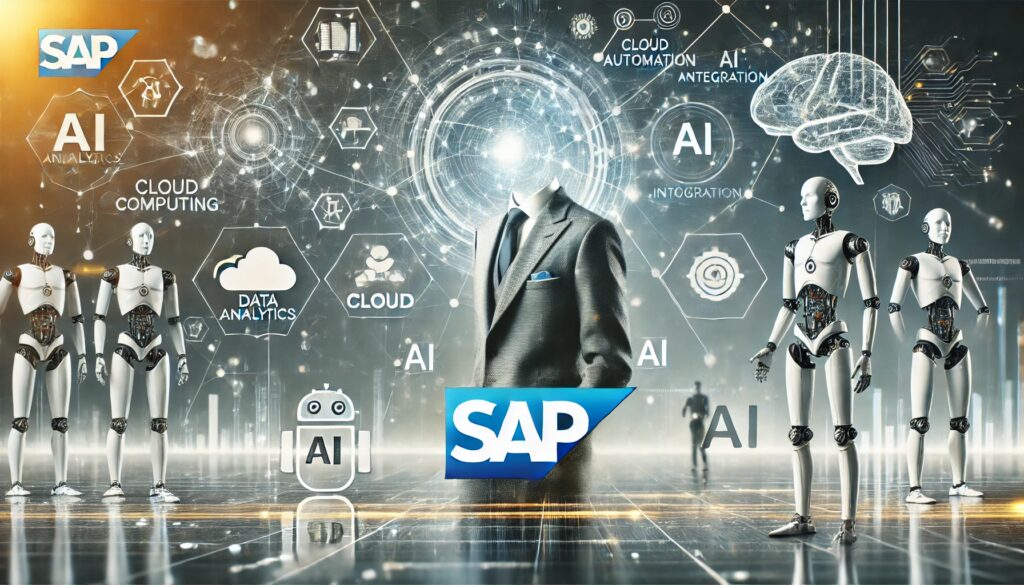
Revolutionizing Business: How AI is Transforming SAP Solutions
AI: The Driving Force in SAP’s Future
In a groundbreaking move, SAP is embedding AI deeply within its ecosystem, aiming to revolutionize enterprise operations. Christian Klein, SAP’s CEO, has championed this transformation, highlighting the profound impact AI will have on enhancing productivity and decision-making across all SAP solutions.
Recent developments in AI and SAP reveal significant advancements and strategic partnerships aimed at transforming business processes. At the 2024 SAP Sapphire conference, SAP announced the integration of their generative AI copilot, Joule, with Microsoft Copilot for Microsoft 365. This integration is designed to enhance productivity by allowing seamless access to information from both SAP applications and Microsoft 365, helping users perform tasks more efficiently within their workflow
A new phase of AI is dawning for us
— Christian Klein CEO SAP
AI in SAP: Enhancing Business Processes
Predictive Analytics
Use Case: Forecasting sales, inventory management, and demand planning.
AI Integration: Machine learning models analyze historical data to predict future trends and outcomes, enabling businesses to make informed decisions about inventory and sales strategies. This predictive capability helps in optimizing stock levels, reducing excess inventory, and ensuring product availability aligns with demand.
Natural Language Processing (NLP)
Use Case: Customer service, chatbots, and voice assistants.
AI Integration: NLP models understand and respond to customer queries, providing more natural and efficient interactions. This technology powers chatbots and virtual assistants in SAP Conversational AI, enhancing customer service by delivering immediate, context-aware responses.
Robotic Process Automation (RPA)
Use Case: Automating repetitive tasks like data entry and report generation.
AI Integration: AI enhances RPA by making it more intelligent, capable of handling exceptions, and learning from new scenarios. This integration automates mundane tasks, freeing up human resources for more strategic activities.
Image and Video Analysis
Use Case: Quality control and monitoring production lines.
AI Integration: Computer vision models analyze images and videos to detect defects or ensure compliance with standards. This technology is crucial in industries like manufacturing, where visual inspection is vital for maintaining product quality.
Fraud Detection and Risk Management
Use Case: Identifying fraudulent transactions and assessing credit risk.
AI Integration: Machine learning models analyze transaction patterns to detect anomalies and potential fraud, helping businesses manage risk more effectively. This capability is embedded in SAP Analytics Cloud, providing advanced analytics and insights.
SAP’s AI Capabilities
SAP Leonardo
Description: A comprehensive digital innovation system that integrates machine learning, IoT, and advanced analytics into SAP applications.
Capabilities: SAP Leonardo helps businesses innovate by embedding AI and IoT into their processes, enabling smarter operations and more efficient workflows.
SAP Conversational AI
Description: A platform for building and deploying chatbots.
Capabilities: SAP Conversational AI enables the creation of intelligent chatbots that interact with users via natural language, enhancing customer service and operational efficiency.
SAP AI Core and AI Foundation
Description: Tools and frameworks for developing, deploying, and managing AI models.
Capabilities: SAP AI Core and AI Foundation provide the infrastructure needed for integrating AI models into SAP systems, offering robust tools for AI development and deployment.
SAP Analytics Cloud
Description: A solution for business intelligence, planning, and predictive analytics.
Capabilities: SAP Analytics Cloud uses AI to provide advanced analytics, predictive insights, and automated decision-making support, transforming how businesses approach data analysis and strategy.
Benefits of Integrating AI with SAP
Improved Efficiency
Automating repetitive tasks and providing predictive insights significantly improve operational efficiency. AI-driven automation reduces manual effort, allowing employees to focus on more strategic tasks.
Enhanced Decision-Making
AI provides data-driven insights, helping businesses make informed decisions. Predictive analytics and real-time data processing enable better forecasting and planning.
Better Customer Experience
AI-powered chatbots and personalized recommendations enhance the customer experience. These technologies ensure customers receive timely and relevant support, improving satisfaction and loyalty.
Cost Reduction
Automation and predictive maintenance reduce operational costs and prevent downtime. By optimizing processes and anticipating issues, businesses can save significant resources.
Competitive Advantage
Leveraging AI provides a competitive edge by enabling innovation and agility in business processes. Companies that adopt AI can adapt more quickly to market changes and customer needs.
Challenges and Considerations
Data Quality and Integration
Ensuring high-quality data and seamless integration between AI models and SAP systems is crucial. Poor data quality can lead to inaccurate insights and suboptimal outcomes.
Scalability
AI solutions need to be scalable to handle increasing amounts of data and growing business needs. Scalable AI infrastructure ensures that businesses can continue to benefit from AI as they expand.
Security and Compliance
Implementing robust security measures and ensuring compliance with regulations is essential. Protecting data privacy and adhering to legal standards is critical for maintaining trust and avoiding penalties.
Skill Requirements
Developing and maintaining AI solutions requires specialized skills and expertise. Businesses need to invest in training and upskilling their workforce to leverage AI effectively.
Conclusion
Integrating AI with SAP can transform business processes by enhancing efficiency, improving decision-making, and providing a better customer experience. However, successful integration requires careful planning, high-quality data, and specialized skills. As SAP continues to innovate and expand its AI capabilities, businesses can look forward to a future where AI-driven insights and automation are integral to their operations.